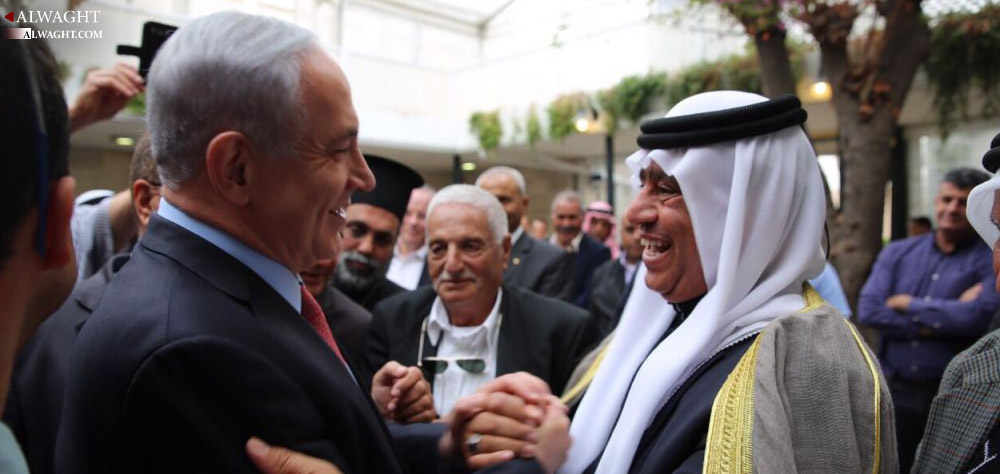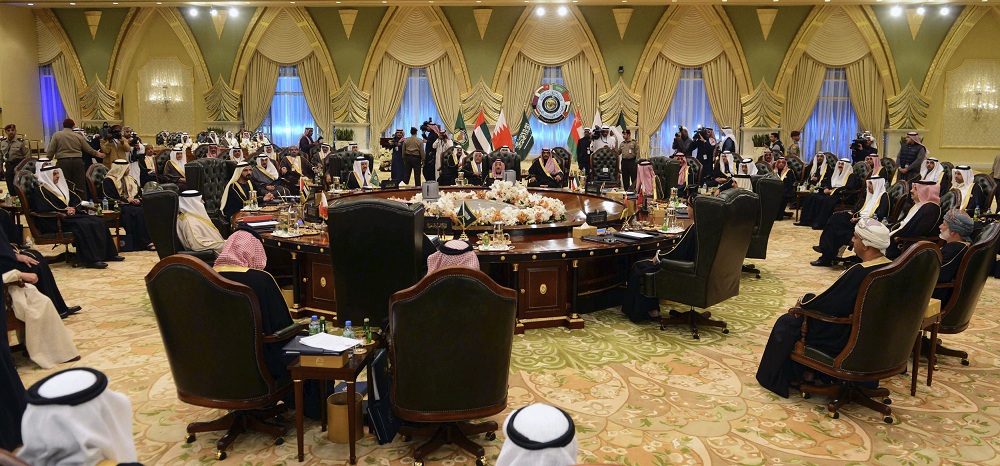Alwaght- Persian Gulf Arab states are weighting up to publicize their secret relations with Israeli regime, Wall Street Journal reported on 15 May when Palestinians mark Nakba Day.
The term "Nakba" ("catastrophe" in Arabic) is a reminder of two fundamental events in Palestinian history: the establishment of Israeli entity in 1948 and the subsequent expulsion of over 800,000 Palestinians from their ancestral homeland.
Nakba symbolizes the tragedy that befell Palestinians in 1948, and the ensuing suffering Palestinians have had to endure under the apartheid regime’s decades-long occupation.

According to the American daily, Persian Gulf Arab regimes, Including Saudi Arabia and the United Arab Emirates, have offered to take concrete steps to establish better relations with Tel Aviv if regime's Benjamin Netanyahu will restart the so-called Middle East peace process.
WSJ report is based on details from a document that was prepared during discussions between various Arab countries. According to the report, Saudi Arabia and the United Arab Emirates, which are leading the proposal, also updated the US and Israeli regime on the bid
While Palestinian resistance movements have reiterated continued resistance to liberate Palestinian territories occupied by the Israeli regime 69 years ago, their oil-rich so-called brothers compile proposal to take unprecedented steps toward normalization with occupying Israeli regime only if the entity in turn makes gestures to the Palestinians, such as freezing settlement construction in parts of the occupied West Bank and easing trade restrictions in the besieged Gaza Strip that is crushing under Tel Aviv's 10-year all-out blockade.
The Arab regimes, according to WSJ, suggest taking steps such as establishing direct telecommunication lines between Tel Aviv and some of the Arab countries, permitting Israeli airlines to fly over the airspace of Persian Gulf states and abolishing trade limitations with the apartheid regime.
While Palestinian, including Hamas' Hani Islayim cry that “If some people have forgotten our cause, we say that we haven’t forgotten and the occupation will be forced out of our land soon, God willing, and Palestine will stay Islamic and Arab,” Persian Gulf Arab leaders offer granting of visas to Israeli athletes and business people interested in visiting Persian Gulf states, only if Netanyahu take steps to advance the moribund peace process with the Palestinians, in particular the freezing of constructing illegal settlements.
Israeli regime has recently announced plans to build 25,000 illegal settlements in the occupied Palestinian territories in defiance of international law.
Tel Aviv regime’s Housing Minister Yoav Galant said recently that the ministry and the so-called Municipality of al-Quds (Jerusalem) had been working for two years on the plan with proposals for 25,000 units, 15,000 of which would be in East al-Quds where the apartheid regime occupied in the 1967 war.
"We will build 10,000 units in Jerusalem and some 15,000 within the (extended) municipal boundaries of Jerusalem. It will happen," Galant told Israel Radio.
UNESCO has recently passed a resolution, in particular, calling out “Israeli occupying authorities” for
their failure to “cease the persistent excavations, tunneling, works and projects in East Jerusalem (al-Quds), particularly in the Old City of Jerusalem (al-Quds), which are illegal under international law."
The resolution, which declared Israeli regime’s sovereignty over al-Quds as "null and void", was backed by 22 countries voting in favor.
But the resolution not only did not deter Israeli officials rather provoked them to expel the UN from occupied Palestinian lands.
Why Tackling Israeli Regime No Longer Arab Leaders’ Priority?
In 1948, when Israel declared existence in the heart of the Palestinian territories and was approved as a member state of the United Nations, the Arab countries in a coordinated move declared war against the newly-forged regime.
The wars of 1948, 1956, 1967, and 1973 that saw military actions of the Arab bloc comprised of Egypt, Syria, Iraq, Jordan, Lebanon, Saudi Arabia, Libya, Kuwait, Sudan, Tunisia, Morocco, and Algeria against the Israeli regime signaled a sensitivity of the Arab world’s leaders to the developments in other Arab countries. But as the time went on, all of the Arab countries, excluding Syria, at the end of the twentieth century stepped out of the Arab front that once confronted the Israeli regime.
One reason was the Arabs' defeats and losing parts of their territories along the Israeli borders. Another reason was the behind-the-scene political developments that presented the major drive for the former anti-Israeli Arab states to opt out of the confrontation with Tel Aviv.

The West, as a key ally of the newly-established Israeli regime, discerned Arabs unity and use of military actions and oil boycott as key instruments against Tel Aviv, and decided to entice the Arab leaders into ending hostility against the Israeli regime. The first Western effort toward this end met its aims five years after end of the last Arab-Israeli war. The result was the Camp David Accords signed in 1978 between the then-president of Egypt Anwar Sadat and the contemporaneous Israeli prime minister Menachem Begin.
The significance of the agreement with Tel Aviv in the West Asian developments was because of the position of Egypt in the Muslim world. Egypt which once garnered resounding popularity in the Arab world at the time of Gamal Abdel Nasser, who raised the flag of pan-Arabism and led the anti-Israeli Arab camp, shook the Israelis hands while signing the agreements, signaling an end to the anti-Israeli spirit.
Following this dramatic event, the anti-Israeli Arab front cracked, creating wide gaps between the opponents and supporters of Cairo policies. The Camp David Accords ushered in an era in which Tel Aviv comfortably pursued its growth to solidify its existence.
Egypt's reward for formal recognition of the Israeli regime was receiving a yearly $2 billion in military aid from the US. This aid allured some other Arab countries into recalibrating their strained ties with Tel Aviv in order not to fall behind in being rewarded with the American dollars.
Meanwhile, the increased competition for gaining influence in the region along with attempts to get the US supports for the Arab leaders against possible foreign risks even pushed the Arabs and Washington into closer relations, which meant reducing anti-Israeli Arab policies. The process of desensitization went to an extent that today not only Arab countries show no sensitivity to the Israeli expansion of its settlements across the occupied Palestinian territories but also the news began to spread that Tel Aviv is aiming to open embassies in the member states of the (Persian) Gulf Cooperation Council.
Meanwhile, the lingering Saudi Arabian rivalry with Iran has been predominantly influential in Riyadh’s closeness to Tel Aviv. The kingdom has viewed the power gain of the Shiite factions in Iraq as a ground built to help Tehran garner further influence in the region. After establishment of new political order in Iraq, Saudi Arabia has gone to great lengths to prevent friendly Iranian-Iraqi relations.
Additionally, Syrian war paved the way for the Islamic Republic of Iran to successfully play a substantial role in one of West Asia's most complicated crises, the Syria crisis.
These events, along with the Saudi inability to tackle the Ansarullah movement of Yemen to restore to power Abdrabbuh Mansur Hadi, the resigned president of Yemen, after two years of apparently asymmetrical war with Yemen pushed the Saudis to grasp at any instruments in a bid to block boost of the Iranian power and on the opposite side decline of the Saudi position on the West Asian political stage.
Accordingly, a couple of months ago, King Salman of Saudi Arabia in a visit to Egypt and after negotiations with President Abdel Fattah el-Sisi took ownership of the strategic Red Sea Egyptian islands of Sanafir and Tiran. He then very silently and away from eyes of the media redirected the two islands' possession to the Israeli military to ensure that no risks will threaten the kingdom from the Gulf of Oman or the Red Sea. This Saudi measure was taken after the West predicted that Iran will hold sway over southern Yemen by means of Ansarullah movement. The news of Israeli intentions to open embassies in the Persian Gulf Arab states came out at the same time.
When the Saudi Arabian policies turned out to prove that the kingdom by itself cannot take on Iran and play the role of big brother in the Muslim world, it moved closer to the Israeli regime to deal Iran a blow through alliance with Tel Aviv.
In such conditions, the Palestinian cause, Israeli fighter jets' airstrikes at the Palestinian people and all-out blockade against the Palestinians are no longer touching for Saudi Arabia and its Arab allies. Actually, the US has managed to distract the Arab attention from the Palestinian cause through allurement. Making exaggeration about Iran’s military capabilities and propagating Iranophobia in the region also come as part of the US policy for this end.
Furthermore, fueling Syrian crisis in a bid to topple President Basher al-Assad by means of supporting the anti-Damascus terrorist and militant groups come as part of attempts to eliminate the last anti-Israeli Arab front, though after six years of war against the Syrian government, they failed to achieve goals.



























